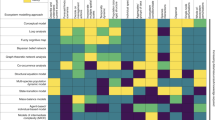ABSTRACT
Unreplicated ecosystem experiments can be analyzed by diverse statistical methods. Most of these methods focus on the null hypothesis that there is no response of a given ecosystem to a manipulation. We suggest that it is often more productive to compare diverse alternative explanations (models) for the observations. An example is presented using whole-lake experiments. When a single experimental lake was examined, we could not detect effects of phosphorus (P) input rate, dissolved organic carbon (DOC), and grazing on chlorophyll. When three experimental lakes with contrasting DOC and food webs were subjected to the same schedule of P input manipulations, all three impacts and their interactions were measurable. Focus on multiple alternatives has important implications for design of ecosystem experiments. If a limited number of experimental ecosystems are available, it may be more informative to manipulate each ecosystem differently to test alternatives, rather than attempt to replicate the experiment.
Similar content being viewed by others
Author information
Authors and Affiliations
Rights and permissions
About this article
Cite this article
Carpenter, S., Cole, J., Essington, T. et al. Evaluating Alternative Explanations in Ecosystem Experiments. Ecosystems 1, 335–344 (1998). https://doi.org/10.1007/s100219900025
Issue Date:
DOI: https://doi.org/10.1007/s100219900025




